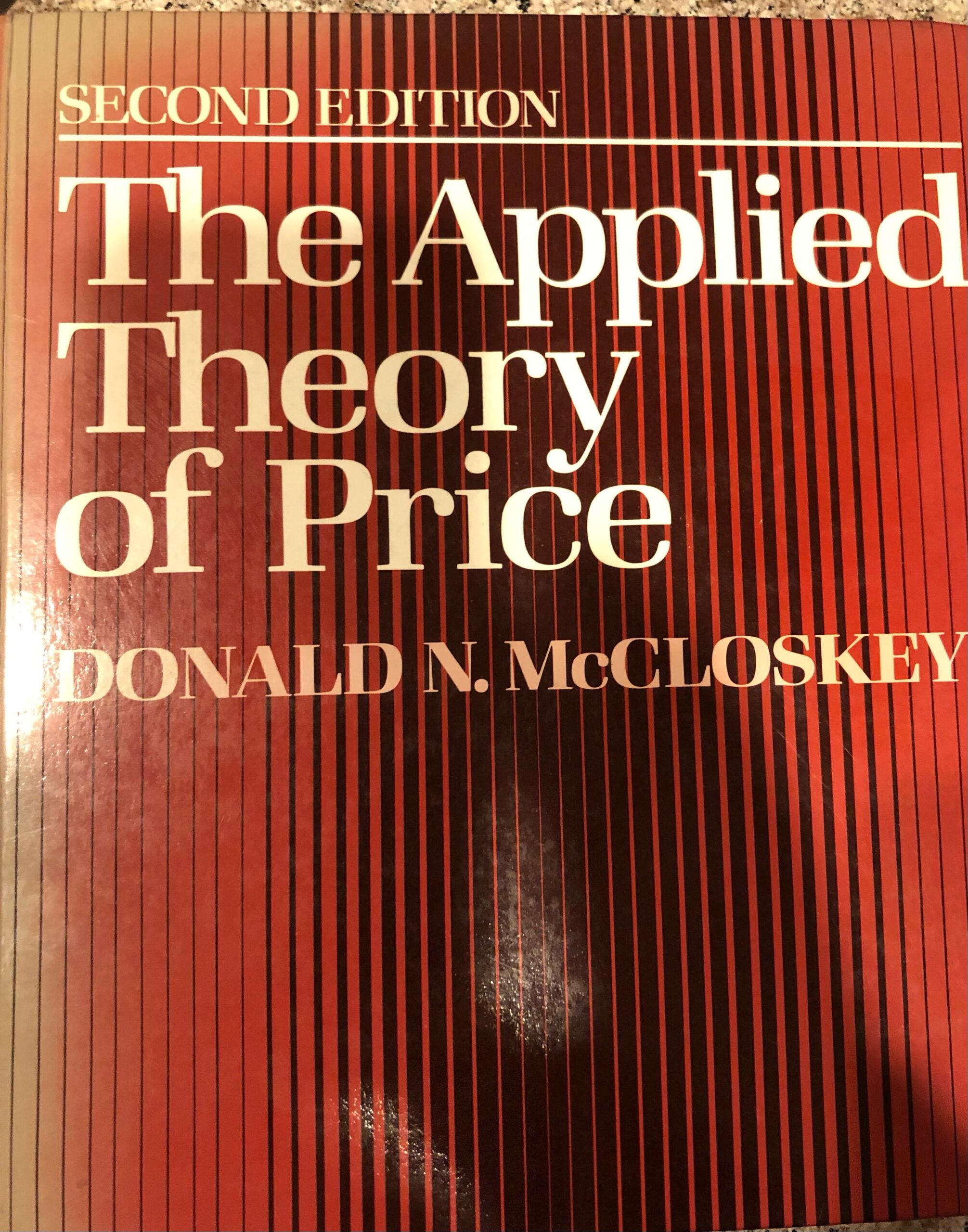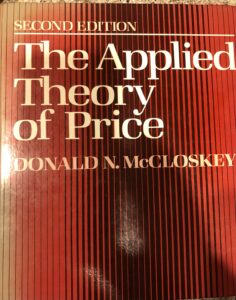

In the 1980s, an intermediate microeconomics text that I was a big fan of was Donald N. McCloskey’s The Applied Theory of Price. It’s very “Chicagoan” in the best sense of that word. If you mastered that book–I mean really mastered it–you could plausibly call yourself a microeconomist and not just a student.
Here’s a link to a pdf of the text, which McCloskey offers at a zero price.
My friend Rick Geddes of Cornell University came across correspondence in 1988 between McCloskey and the president of Penn State University. I won’t quote the whole thing because McCloskey’s letter was lengthy. He showed more respect for the outrageous president than I would have.
Here’s the relevant section of the text: it’s about racial discrimination in the labor market:
Q: If employers, to a varying degree, have a distaste for hiring black workers rather than white workers at the same wage, then a rise in the proportion of blacks to whites in a labor market will be accompanied by a fall in the relative wages of blacks.
A: As the proportion rises, the blacks must face more and more discriminatory employers. All blacks must be paid the same wages (assuming that blacks and whites are identical except for color), or else the low-wage person will undersell the high-wage one. So the black wage is determined by the wage differential that just compensates the most discriminatory employer hiring any black for hiring “the” marginal one. Therefore, true.
On October 21, 1988, President Bryce Jordan of Penn State University wrote McCloskey, then a tenured professor at the University of Iowa, asking McCloskey to change the text. Jordan wrote:
I am writing on behalf of concerned students at Penn State who are distressed about certain language in your text, The Applied Theory of Price. I understand that Jim Rodgers, head of Penn State’s Department of Economics, has discussed these concerns with you in that phrases exist in the text that are perceived to be offensive to students of African-American descent. We refer specifically to page 451 of the text where it cites: “(assuming that blacks and whites are identical except for color).” It would be my hope that you would work with your editors to see that this particular passage is deleted from forthcoming editions of the text.
In McCloskey’s long answer, he tried to figure out what Jordan meant and responded to each potential meaning. In my view it was a good-faith effort.
Then McCloskey turned to the wider issue, writing:
Let me be perfectly clear that I am not going to accede to your demand. I would literally rather go to jail. I must resist of course any such request for censorship, however politely expressed–and yours is clumsily and insultingly expressed–or however influential the requestor–and you are very influential. I would have thought that the president of Penn State would know this, but these are bad times for free inquiry, when those who are supposed to defend it shirk. I won’t. Your request for revision is politically motivated and wholly unreasoned, and I must resist it with all my tiny strength.
McCloskey ended the letter with the following:
I have wider concerns. My concern is that you represent a new breed of administrators with a feeble understanding of academic freedom
(which is not “bestowed” by anyone; it is a fragile social custom, easily taken away, by such actions as yours). My concern is that you and your students have somehow gotten the idea that democratic life is a matter of making demands and issuing orders. My concern is that your rhetoric of “sensitivity” is a cover for attacking the most vulnerable parts of the society, the conversations of serious people. Most of all my concern is that we college professors are somehow not educating people to what real sensitivity to moral issues is about, something beyond Dr. Feelgood “concerns” unarticulated and backed by threats of boycott and uses of authority. But I can’t threaten you in turn to get you to respond to my concerns. I can only reason with you.
Note that second sentence in the above quote. Man, was McCloskey ever on to something. The rot was there at least 35 years ago.
For more on labor market discrimination, see Linda Gorman, “Discrimination,” in David R. Henderson, ed., The Concise Encyclopedia of Economics.
Update: Dan Klein pointed out that in my haste, I left out some key words in McCloskey’s answer. That is now corrected.

READER COMMENTS
Monte
Mar 2 2023 at 3:59pm
I’m a fan of McCloskey and I personally have no problem with the passage in question, but I can understand where others might take issue. There’s no doubt McCloskey intended it for educational purposes only, but it disregards the impact of what today we call “systemic racism” and the historical legacy of racism on the “lived experience of blacks.” The passage could have been omitted to avoid any squabble, but I applaud McCloskey for refusing to acquiesce and standing up for academic freedom.
BTW, I cut my teeth on Jack Hirshleifer’s competing text, Price Theory and Applications, 3rd ed (1984). I think I’ll dust off my copy and have another go at mastering it. Thanks for jarring my memory.
David Henderson
Mar 2 2023 at 5:42pm
You write:
How does it disregard that?
You write:
Yes, it would have avoided a squabble. It also would have avoided getting his point across.
You write:
Thank you. At least we agree on that.
You write:
I like that one too, although not as much. My favorite part is where Jack uses the light bulb example to show that a monopolist would not want to suppress a cost-saving invention.
Mark Barbieri
Mar 2 2023 at 6:36pm
I don’t think that omitting the passage would have avoided a squabble. Those offended would have chosen to be offended by the comparison, insisting that it implied racism in some other way. The rewards for being offended have increased significantly since 1980s, which is why I think we see so much more of it even though the reasons for offense seem to be so much more rare.
Incidentally, if I were to try to make the general point that McCloskey was making, I would use attractive and unattractive people rather than using races. People seem less sensitive in discussions around discrimination based on attractiveness.
Monte
Mar 2 2023 at 9:35pm
Maybe “indifferent” is a better word. We’re overly sensitive discussing such comparisons today, not so much back then.
I’m not sure. The parenthetical doesn’t seem essential to the point. Assuming that blacks and whites are identical (or not) except for color is implicit in the topic being discussed, is it not?
Thomas Lee Hutcheson
Mar 2 2023 at 6:51pm
I think the passage fails to consider the fact that discrimination based on employer preferences would not persist in a competitive market. I though that was well know at the time, so it’s surprising.
David Henderson
Mar 3 2023 at 12:24am
You write:
It “fails” to consider it because it’s not true. Read Becker’s The Economics of Discrimination. Or think carefully through McCloskey’s reasoning.
Jim Glass
Mar 3 2023 at 1:45pm
It “fails” to consider it because it’s not true…
This point explained:
https://www.chicagobooth.edu/review/how-gary-becker-saw-the-scourge-of-discrimination
OTOH, one has to really enjoy how Governor George Wallace — who barred blacks from the University of Alabama while running for President proclaiming “segregation now, segregation tomorrow, segregation forever” — promptly desegregated the Alabama football team after losing a big game to USC.
It’s a great story:
https://www.youtube.com/watch?v=CnOpZvEulvY&t=1s
Thomas Lee Hutcheson
Mar 4 2023 at 10:24pm
Could you explain? It seems to me (and I thought that was the conventional wisdom) that an employer who systematically did not employ the best person for each job would have higher costs of lower quality and would be outcompeted by employers not suffering from a preference for discrimination. What am I missing?
Jon Murphy
Mar 5 2023 at 1:27pm
The Law of Demand and elasticity: increased costs reduced quantity demanded, but not to zero.
Phoenix44
Mar 3 2023 at 2:38pm
You misunderstand the point. The argument relies on the people being equal other than in terms of the difference being used to discriminate between them – equal ability, equal training, equal experience. The argument could use Martians and Venusuans, with Martians paid less because they don’t have antenna. As for “lived experience” what experience is possible that isn’t “lived”? What is the opposite exactly? Imagined experience?
nobody.really
Mar 5 2023 at 4:05am
“Democratic education, says Aristotle, ought to mean, not the education which democrats like, but the education that will preserve democracy….
The demand for equality has two sources; one of them is among the noblest, the other is the basest, of human emotions. The noble source is the desire for fair play. But the other source is the hatred of superiority…. There is in all men a tendency … to resent the existence of what is stronger, subtler, or better than themselves. In uncorrected and brutal men this hardens into an implacable and disinterested hatred for every kind of excellence…. There is reason to be alarmed at the immense vogue today of such words as ‘high-brow’, ‘up-stage’, ‘old school tie’, ‘academic’, ‘smug’, and ‘complacent’….
The kind of ‘democratic’ education which is already looming ahead is bad because it endeavors … to appease envy…. Envy is insatiable…. No attitude of humility which you can possibly adopt will propitiate a man with an inferiority complex. [Moreover], you are trying to introduce equality where equality is fatal.
Equality (outside mathematics) is a purely social conception. It applies to man as a political and economic animal. It has no place in the world of the mind. Beauty is not democratic… Virtue is not democratic…. Truth is not democratic…. Political democracy is doomed if it tries to extend its demand for equality to these higher spheres. Ethical, intellectual, or aesthetic democracy is death.
A truly democratic education—one which will preserve democracy—must be, in its own field, ruthlessly aristocratic, shamelessly ‘high-brow’….”
C.S. Lewis, published in the English literary magazine Time and Tide, vol. XXIV (September 4, 1943) at 717, “Notes on the Way,”—or perhaps as “Democratic Education” in 1944—and republished as “Democratic Education” in Present Concerns (1986) at 32-36,
Rob
Mar 7 2023 at 1:00pm
Is there a link to the full letter?
Comments are closed.